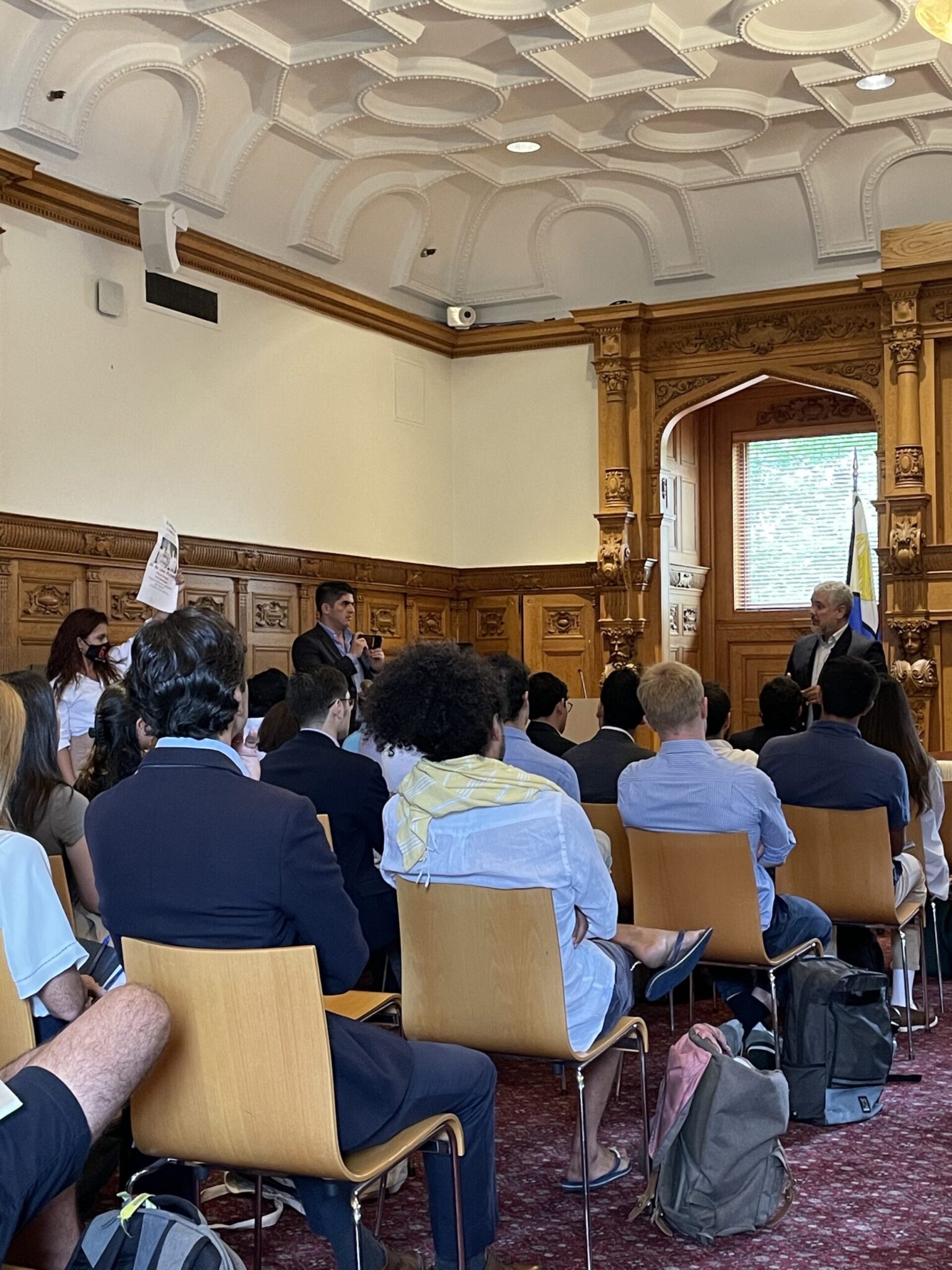Former Colombian president faces student outcry at Jackson event
Undergraduate and graduate students questioned the University’s decision to invite Iván Duque, who served as the president of Colombia from 2018 to 2022, as a speaker at the Jackson School.

Esma Okutan, Contributing Photographer
A student held up a sign with the phrases “They are killing us” and “No more assassinated leaders” at an event hosted by the Jackson School of Global Affairs on Wednesday.
The demonstration targeted Iván Duque, president of Colombia from 2018 to 2022, and referred to the deadly crackdowns on anti-government protests and assassinations of social leaders during Duque’s time in office.
The former president visited the University for a discussion about leadership at an event hosted by the Jackson School and co-sponsored by the Yale International Leadership Center, Yale MacMillan Center’s Council on Latin American and Iberian Studies and the student organization Jackson Latin America and the Caribbean.
“It was frustrating to sit down in that room and hear him talk about leadership and his policies concerning COVID-19,” Lucía Amaya ’25, who attended the talk, told the News. “What I remember of his time in office is the strikes, the police violence, the fear of having my brother leave to protest in the streets, the sorrow after reading headline after headline that recounted massacres and deaths of environmental leaders.”
Duque’s talk focused on Colombia’s response to the COVID-19 pandemic and leadership challenges in the Americas, including the fight against drug trafficking and the Venezuelan refugee and migrant crisis.
After the talk, attendees had the opportunity to ask Duque questions.
Amaya, who is from Colombia, told the News that one of the attendees asked Duque why he had allowed the 2019 military bombing of a guerrilla base that left “numerous minors” dead. The attendee also alleged, per Amaya, that Duque had known there were civilians at the bomb site and accused Duque of referring to the children as “human shields.” The News could not reach the attendee for comment.
“We encourage vigorous intellectual debate at our public events and in our classrooms at the Jackson School,” Jim Levinsohn, dean of the Jackson School, wrote to the News. “While some attendees voiced concerns, they did so in a respectful manner.”
Duque, who was elected president of Colombia in June of 2018, did not respond to the News’ request for comment.
According to Levinsohn, Duque was invited to visit campus by Jackson Senior Fellow Jessica Faieta, who is the Resident Representative of the United Nations Development Program in Colombia.
Amaya told the News that another attendee asked Duque about police violence during the social unrest and national strikes that rocked the country between 2019 and 2021. The former president answered that the military bombing and instances of police violence were isolated cases not indicative of a systemic issue.
Luis Orozco ’26, however, was not satisfied by Duque’s response.
“The incidents that the protestors mentioned are very much institutional issues that have been aggravated by Duque’s mismanagement and political extremism,” said Orozco, who was at the event. “But he is a professional politician and can easily run circles around these accusations if they’re not developed soundly.”
Amaya told the News that she was “sad” and “surprised” when she learned that the Jackson School was hosting the talk with Duque.
Some students, according to Amaya, attended the event wearing facemasks with the number 6,402 written on them. The number refers to Colombia’s “False Positives” scandal, in which 6,402 Colombian civilians were killed by the governmental forces as “false enemy combatants” between 2002 and 2008.
Orozco wrote in an email to the News that the Jackson School’s introduction of Duque “was almost comical” and drew attention primarily to his leadership skills and membership in prestigious organizations while failing to present an “objective portrait of his leadership.” He also noted that the written description used to promote the event said Duque was going to speak about the country’s democratization and the environment — neither of which, per Orozco, he discussed during the talk.
Orozco told the News that audience members who were not familiar with Colombia’s broader social context might have left Duque’s talk believing him to be “innocent of all blame” without any knowledge of his controversial actions.
University officials, however, doubled down on their decision to invite Duque.
“Colombia is a complicated country with a difficult past,” Emma Sky, director of International Leadership Center at the Jackson School, said. “President Duque had successes during his presidency, especially with the handling of Covid and the economic bounce back, and he also had failures – as he admitted. For those at Yale interested in going into politics, there was much to learn from his experience. Regarding the protestors, they voiced their concerns respectfully. President Duque listened fully and empathetically and responded politely.”
Levinsohn also told the News that, regardless of personal disagreements, students could “learn a great deal from the political leaders and policymakers about the challenges they face in office.”
But Attilio Bernasconi, a visiting postdoctoral fellow at the Macmillan Center and a lecturer of Ethics, Politics and Economics, said that he felt “uncomfortable” during the talk.
Bernasconi told the News that he had been personally affected by Duque’s regime, and questioned the ethics of allowing an individual like Duque to speak at the University.
“When the voice or the person represented is officially known for violations of human rights, what is problematic is that inviting a person like this to the University legitimizes the person in power and what he represents,” Bernasconi said. “For Colombians who are victims of the regime directly or indirectly, the presence of a person like this re-victimizes those people.”
The student who held up the sign described above did not respond to the News’ request for comment.







